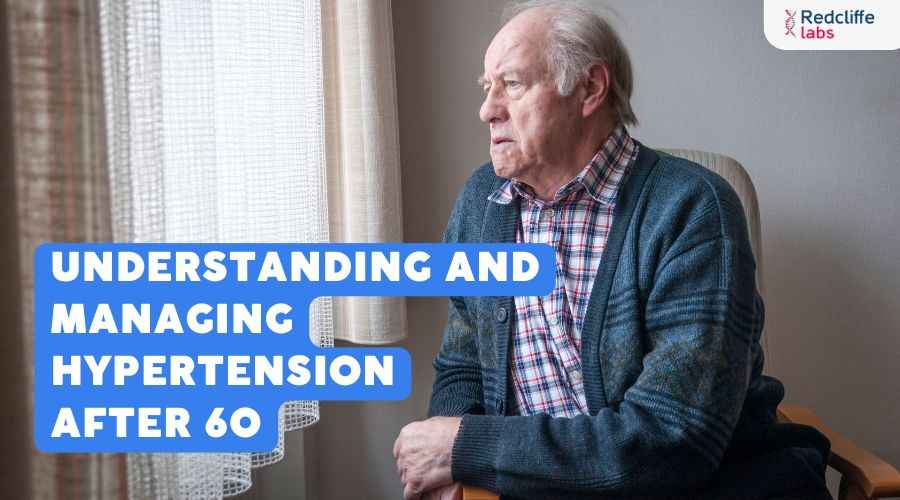Understanding and Managing Hypertension After 60

Medically Reviewed By
Dr. Geetanjali Gupta
Written By Muskan Taneja
on Mar 7, 2025
Last Edit Made By Muskan Taneja
on Jul 19, 2025

Did you know? Studies found that the prevalence of hypertension among individuals in their 60s in India is around 48.4%, with women (51.3%) accounting for 6% higher than men (45.5%). This means nearly half of people aged 60 and above in India are likely to have hypertension.
Hypertension has become a common health condition irrespective of age and gender. However, the risk is higher for older age groups, typically 60 and above. The prevalence significantly increases with advancing age. The best part is hypertension can be managed with simple lifestyle changes. Before getting on management strategies, you must understand the causes and symptoms of hypertension after 60.
This comprehensive guide will provide insights about hypertension, its causes, and symptoms after 60.
About Hypertension
Blood pressure is important for maintaining the overall circulatory system. It exerts the force to push blood through arteries to deliver oxygen and nutrients to the body’s tissues and organs.
Maintaining a healthy blood pressure is necessary, as both too high and too low can lead to serious health complications.
High blood pressure or hypertension is a long-term medical condition where the blood vessel pressure is consistently too high.
Hypertension is a common chronic disease in 60 years or above. This can damage the kidneys, heart, and brain. Additionally, it can increase the risk of heart attack, heart failure, and stroke. Health experts also found that hypertension after 60 years can cause dementia and circulation problems (peripheral artery disease) and contribute to erectile dysfunction in men.
Understanding Blood Pressure Levels in Elderly People
| Blood Pressure in Adults above 60 | Systolic (mm/Hg) | Diastolic (mm/Hg) |
| Low blood pressure | 90 or lower | 60 or lower |
| Normal Blood Pressure | Lower than 120 | Lower than 80 |
| High blood pressure | 120-129 | Lower than 80 |
| High blood pressure stage 1 (severe) | 130-139 | 80-89 |
| High blood pressure stage 2 (more severe) | 140 or higher | 90 or higher |
| High blood pressure crisis (need immediate doctor consultation) | 180 or higher | 120 or higher |
Also, read https://redcliffelabs.com/myhealth/health/early-signs-of-hypertension-in-your-20s-and-30s/
Causes and Risk Factors of Uncontrollable High Blood Pressure in the Elderly

Certain scenarios contribute to high blood pressure in older adults. However, the primary cause of hypertension is the ‘natural aging process.’ Aging may lead to stiffening of the arteries, resulting in ‘isolated systolic hypertension.’ Apart from aging, there are other causes of hypertension.
- Lack of physical activity
- High salt intake
- Obesity
- Certain medications
- Stress
- Genetics/family history of hypertension
- Medical conditions
- Sleep apnea
- Chronic kidney disease
- Diabetes
- Metabolic syndrome
- Thyroid problems
5 Symptoms of Hypertension in Elderly

Undiagnosed, untreated, and uncontrolled hypertension may lead to severe health complications like stroke, chronic kidney disease, and heart attack. Meanwhile, early detection of hypertension symptoms in the elderly can prevent these complications.
- Severe Headaches: Severe headaches are a common sign of hypertension in the elderly. However, some people may not experience headaches unless their blood pressure is 150 or over 60.
- Irregular Heartbeat: Hypertension can cause stress, which may stimulate the electrical impulses, causing irregular heartbeat.
- Shortness of Breath: It is an early sign of hypertension. A person with hypertension can experience difficulty breathing and pain in the chest.
- Dizziness: Dizziness is often ignored among older adults. However, dizziness can be an early warning sign of stroke. It is advisable not to ignore this sign and seek a medical consultation as soon as possible.
- Vision Changes: High blood pressure in older adults can cause hypertensive retinopathy. It can be treated with lifestyle changes and medications.
Treatment and Management for Hypertension After 60
Hypertension in older adults is preventable with simple lifestyle modifications. However, in case you are unable to control home remedies, it is recommended to consult a clinician for personalized assistance and take the prescribed medication for better health outcomes.
The management of hypertension after 60 is a comprehensive strategic plan of diet, regular exercise, medication, and weight management.
- Set a Medication Reminder:
Use a medication reminder system to keep track of your medications.
- Monitor your Blood Pressure Levels:
Blood pressure fluctuations are normal after 60, and timely monitoring is an effective management strategy for hypertension after 60.
- Indulge more in Physical Activity:
If you are obese, incorporate walking into your daily schedule and try to lose some weight. This can help with hypertension.
- Limit the Consumption of Alcohol- Excessive consumption of alcohol may cause adverse effects on arteries. So, make sure you avoid or limit the consumption of alcohol.
- Practice Stress Management- Stress can cause high blood pressure. Monitor your stress levels and practice yoga and meditation to manage stress levels.
- Consume Food that Regulates Blood Pressure- Incorporate food low in fat and fat-free products that can regulate blood pressure levels. Also, avoid food high in sodium and saturated fat, as they may raise blood pressure, causing high blood pressure.
The Bottom Line
Hypertension after age 60 is a common medical condition. It can be managed with lifestyle modifications, such as diet control, little exercise, and limiting sodium intake. Diagnostics can also help in early diagnosis, prevention, management, and treatment. If you experience symptoms, be mindful of your diet and take the Hypertension Advance Test from Redcliffe Labs to prevent complications.